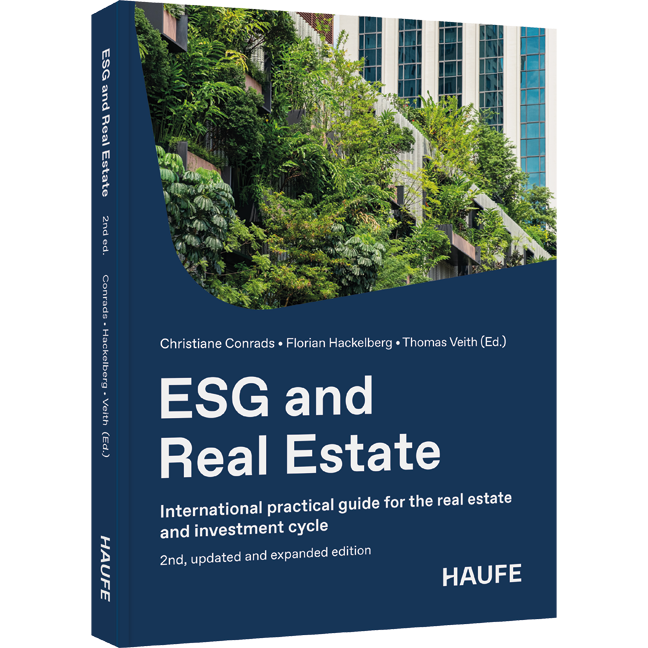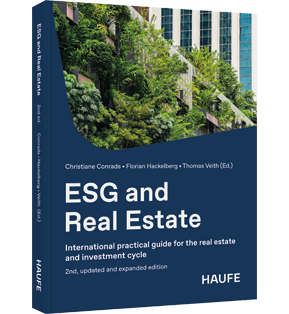ESG and Real Estate
International practical guide for the real estate and investment cycle
- First book on ESG and the real estate industry
- Best practice examples as well as insights
- Written by an interdisciplinary team of experts
Comprehensive practical handbook explaining current developments in the field of "Environmental Social Governance" and their impact on the real estate industry.
Mehr Produktinformationen| Bestell-Nr.: | E16089 |
|---|---|
| ISSN: | |
| ISBN: | 978-3-648-18229-1 |
| Auflage: | 2. aktualisierte und erweiterte Auflage 2026 |
| Umfang: | 760 Seiten |
| Einband: | Hardcover |
| Produktart: |
Bitte kontaktieren Sie unseren Kundenservice.





DIESES PRODUKT TEILEN
Bitte kontaktieren Sie unseren Kundenservice.
Produktinformationen
ESG has evolved into a structural control framework for investment decisions, business models, regulations, and risk management. This international handbook provides an in-depth and practical analysis of the ESG transformation within the real estate industry.
The second, completely revised edition illustrates how ESG has evolved from a guidance framework to an operational management tool. It has been expanded to include geographical perspectives and delves deeper into biodiversity, the circular economy, and sustainability reporting. Authors from leading international real estate companies, consultancies, and academic institutions shed light on ESG requirements in national and international contexts.
Contents:
- Comprehensive interdisciplinary analysis of regulations and market trends
- ESG in a national and international context, including regional market chapters, international contributions, and local specifics of ESG strategies
- ESG strategies and best practices for implementation in processes and systems
- Expanded topics include climate protection, biodiversity, the circular economy, and sustainability reporting
- Interdisciplinary perspectives include approaches from other industries, such as automotive and airports
ESG has evolved into a structural control framework for investment decisions, business models, regulations, and risk management. This international handbook provides an in-depth and practical analysis of the ESG transformation within the real estate industry.
The second, completely revised edition illustrates how ESG has evolved from a guidance framework to an operational management tool. It has been expanded to include geographical perspectives and delves deeper into biodiversity, the circular economy, and sustainability reporting. Authors from leading international real estate companies, consultancies, and academic institutions shed light on ESG requirements in national and international contexts.
Contents:
- Comprehensive interdisciplinary analysis of regulations and market trends
- ESG in a national and international context, including regional market chapters, international contributions, and local specifics of ESG strategies
- ESG strategies and best practices for implementation in processes and systems
- Expanded topics include climate protection, biodiversity, the circular economy, and sustainability reporting
- Interdisciplinary perspectives include approaches from other industries, such as automotive and airports
ESG has evolved into a structural control framework for investment decisions, business models, regulations, and risk management. This international handbook provides an in-depth and practical analysis of the ESG transformation within the real estate industry.
The second, completely revised edition illustrates how ESG has evolved from a guidance framework to an operational management tool. It has been expanded to include geographical perspectives and delves deeper into biodiversity, the circular economy, and sustainability reporting. Authors from leading international real estate companies, consultancies, and academic institutions shed light on ESG requirements in national and international contexts.
Contents:
- Comprehensive interdisciplinary analysis of regulations and market trends
- ESG in a national and international context, including regional market chapters, international contributions, and local specifics of ESG strategies
- ESG strategies and best practices for implementation in processes and systems
- Expanded topics include climate protection, biodiversity, the circular economy, and sustainability reporting
- Interdisciplinary perspectives include approaches from other industries, such as automotive and airports
| Bestell-Nr.: | E16089 | |
|---|---|---|
| ISSN: | ||
| ISBN: | 978-3-648-18229-1 | |
| Auflage: | Auflage/Version: | 2. aktualisierte und erweiterte Auflage 2026 |
| Umfang: | 760 | |
| Einband: | Hardcover | |
| Produktart: |
Christiane Conrads, LL.M., is a lawyer and co-head of the German real estate practice group at PwC Legal and head of the EMEA Real Estate ESG group at PwC.
Prof. Dr. Florian Hackelberg is Professor of Real Estate Economics at the Berlin School of Economics and Law. Prior to this, he worked for many years in the Advisory Real Estate division at PwC in Berlin and Shanghai. After studying civil engineering and management in Germany, England and China, he obtained his doctorate from the Technical University of Berlin and completed a master's degree in International Relations at the University of Cambridge.
Thomas Veith is a partner at PwC in Frankfurt, leading the global Real Estate sector as well as Real Assets in Germany. He has over 30 years of experience in the real estate industry. After studying economics, he initially initiated real estate funds at a private bank before continuing his career at PwC.
DIESES PRODUKT TEILEN

